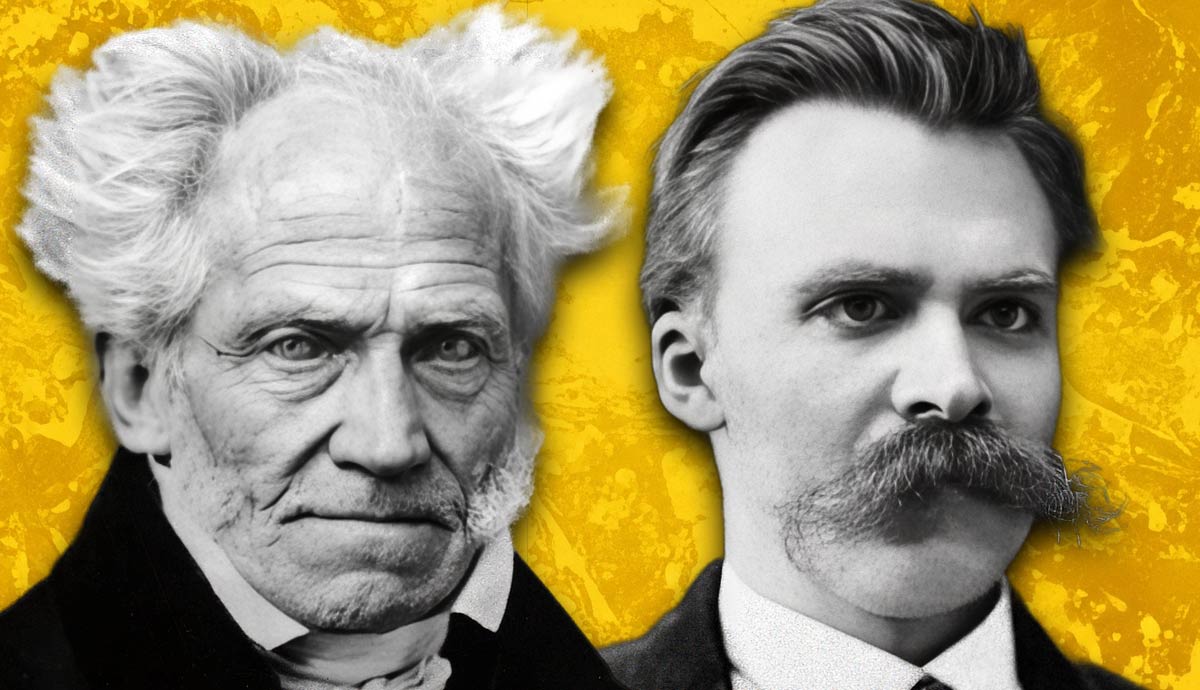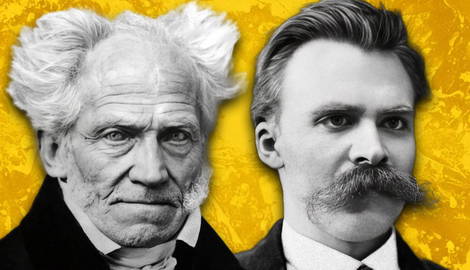
Does life weigh us down, or is it an adventure we should accept? Nietzsche and Schopenhauer disagreed deeply on the meaning of existence and the nature of human suffering. Schopenhauer, the original pessimist, thought that life inevitably brought pain and torment—and that the best way to deal with this was to have nothing to do with the world or its wretchedness. Nietzsche had a glass-half-full attitude. He believed that suffering was a necessary spur for self-development: i.e., “What doesn’t kill you makes you stronger.” Let’s explore their ideas further.
Schopenhauer’s Pessimism: Life as Suffering

Portrait Photograph of Arthur Schopenhauer, by Johann Schäfer, 1859. Source: Wikimedia Commons
Picture existence as an infinite treadmill of wants. You’re always after something, but no sooner do you obtain it than a further wish takes its position. This was Arthur Schopenhauer’s view of the world.
At the heart of his philosophy is The Will: an irrational, blind drive that motivates all living things. We think we’re acting for good reasons, but really, we’re just obeying the commands of this uncontrollable force, which can never be satisfied, and so we always want more.
For Schopenhauer, suffering defines human reality. True, we can sometimes be happy—but that feeling won’t last; at best, it’s merely a brief break from one kind of pain and the imminent arrival of another.
Consider hunger: you have a meal and feel good, but before long, the pangs return. Now think about this pattern occurring across all human wantings (for love, success, security): life becomes an exercise in feeling frustrated.
How can we break out of it? Schopenhauer proposed three paths:
- Asceticism – Renouncing desires (as monks might).
- Art and Music – Getting so lost in something beautiful that one forgets oneself temporarily.
- Compassion – Realizing everyone is plagued by wants and wishing them well anyway (rather than just looking out for number one).
In Buddhism, there is Nirvana, which is reaching a state where desire is wiped out. This is a bit like that. When Stoics, such as Marcus Aurelius, said one should be indifferent to everything except virtue, it was similar in a way.
But unlike those philosophers from ancient times, Schopenhauer offers no cheery messages about how to be content, just thoughts on how best we can understand our suffering for what it is.
Nietzsche’s Affirmation: Life as a Will to Power

Friedrich Nietzsche, Friedrich Hermann Hartmann, c. 1875. Source: Wikimedia Commons
Schopenhauer believed that suffering must be avoided at all costs since it traps us. Nietzsche disagreed: he thought pain could sometimes be useful—even necessary.
An athlete feels intense discomfort but keeps going because they want to win; an artist takes terrible sadness and uses it to create something beautiful. For Nietzsche, too, suffering was valuable: by working through awful experiences, one might become a better person.
Nietzsche didn’t think people should reject life in favor of being miserable on purpose (asceticism). But he wasn’t interested in pretending everything was fine either. He thought great art could show how terrible reality can be, while still making life seem worth living.
He thought Schopenhauer was too passive. Life is not about being detached but rather staying involved, accepting struggle, and having a say in how things turn out.
Nietzsche puts forward a question: do you want to avoid suffering, or do you want to get good at it? His own view is strong and clear: people who lead fulfilling lives don’t shy away from challenges. They take it on board.
Morality and the Problem of Compassion

When it came to morals, Schopenhauer said there was really just one good thing: compassion (he called it Mitleid). If you want to live a good life, he thought, you should be kind when other people are in pain.
Because if we’re all out for ourselves, then nobody helps anybody, and we end up even more miserable. But acting out of concern for others can connect us with them, and shared suffering is less bad than going through it alone.
This way of looking at things has some affinities with Buddhist ethics—a point which delighted Schopenhauer, who was well-read in Indian philosophy (though perhaps rather less pleased had he known how few original ideas they contain).
Nietzsche connected this criticism to Christianity, asserting that Christian morality was designed to exalt weakness: it is a “slave morality.”
He did not want people to feel sorry for one another—an attitude he associated with belief in God’s mercy. He wanted individuals to give up pushing the idea of pity around and instead inspire themselves and others “to become what you are.”
Today, we see the same pattern but with more important terms: should policy aim to make things better for those at the bottom (Schopenhauer’s view on welfare) or encourage the so-called survivors to excel? It remains an open question in politics, self-help, and other fields.
Art and the Role of Aesthetics

Schopenhauer viewed art as more than just a means of experiencing beauty. To him, it was also a way to escape. Since existence itself is full of pain, he explained, one can only find relief by briefly freeing oneself from the relentless turmoil of the cosmic urge.
Whenever we listen to music, study a painting, or read a poem, the philosopher continued, we are given a glimpse into something deeper: the reality that lies beyond our everyday desires and frustrations.
He particularly admired Beethoven for creating works whose astonishing power carries human minds outside everyday concerns—if only for a while.
Nietzsche had a very different view. Art, he believed, should not be about fleeing life’s hardships. Instead, it must tackle them head-on, take them up, and give them meaning.
Truly great art does not protect us from the world’s brutality after all. Rather, it enables us to confront exactly what’s so appalling in reality in such a way that we can cope with it.
He was a fan of Greek tragedy, in which suffering is not denied but rather explored as an essential aspect of being alive. Tragedy doesn’t show us a way out. It shows us how to face life with bravery.
Nietzsche’s preferred composer was Richard Wagner, especially in the latter’s early operas, where strength, conflict, and heroism are expressed via music. Wagner’s works were, for Nietzsche, an unadulterated illustration of the Will to Power: they celebrate life with all its passion.
So, should art offer a refuge from suffering (as Schopenhauer thought)—or help us turn suffering into something to celebrate (as Nietzsche believed)? Their arguments still influence whether we think music, literature, and creativity should comfort or challenge us today.
The Ultimate Question: To Embrace or Escape Life?

At the heart of the Nietzsche vs. Schopenhauer debate remains one simple, overarching question: must we affirm and accept life, or must we overcome and leave it behind?
For Schopenhauer, the enlightened being retires from the world. Since the world is full of suffering, the best thing to do is to unentangle from desire, from striving, from competition.
Ascetic monks and mystics, renouncing earthly pleasures, delighted him. To him, existence isn’t something to be overcome; it is more something from which to unentangle.
Nietzsche completely disapproved of this passive approach. Instead of shunning existence, he said, the strongest of them embrace its adversities and triumph. To Nietzsche, it’s the fight that fortifies, and pain isn’t a curse but the source of growth.
To test this, Nietzsche devised the Eternal Recurrence: if your entire life had to be lived again and again, exactly the same, for all of eternity, would you be pleased with it? If not, then, he says, something needs changing—we must remake our lives such that we’d love them for all of eternity.
This contrast defines their worldview:
- Schopenhauer’s asceticism = renouncing desire, peace, and disengagement.
- Nietzsche’s heroism = striving, domination, and transcendence.
So, which way, then, is the way of choice? To leave or embrace. That’s the greatest dilemma they leave for us.
Legacy and Influence: Whose Vision Won?

Schopenhauer and Nietzsche have both made enduring impacts on philosophy, but the wider world has been affected by their legacies in very different ways.
Freud was deeply influenced by Schopenhauer. He developed his psychology from the idea that human beings are driven by unconscious desires, similar to Schopenhauer’s blind will.
Wagner found Schopenhauer’s idea that music could allow people a glimpse beyond suffering fascinating—and it inspired some of his greatest operas. Tolstoy and Western thinkers inspired by Buddhism also embraced Schopenhauer’s pessimism: the belief that we live in the worst of all possible worlds.
Some see detachment from desire as a route to wisdom. In art, his influence can be seen in minimalist works, which concentrate on beauty and take little notice of the world around them.
His philosophic pessimism resonates today, leading many to seek inner peace (often via meditation), turn away from consumerism (minimalism), or embrace solitude.
However, Nietzsche had an even bigger impact on the world we live in today. His ideas about overcoming yourself, being an individual, and creating new values were a major influence on existentialism (think Sartre and Camus) and postmodernism (think Foucault or Deleuze)—even things like self-help gurus or leadership coaches owe a debt to him.
And maybe they are both right. Nowadays, do we still believe that suffering is something to get away from at all costs, or has it become just another challenge that might be good for us?
Ultimately, only you can decide how to live with the uncomfortable truths we all face. Do you want to be like Schopenhauer and try to find tranquility (while avoiding most things)? Or take up Nietzsche’s offer: embrace life in all its messiness and try to create something that feels important?










